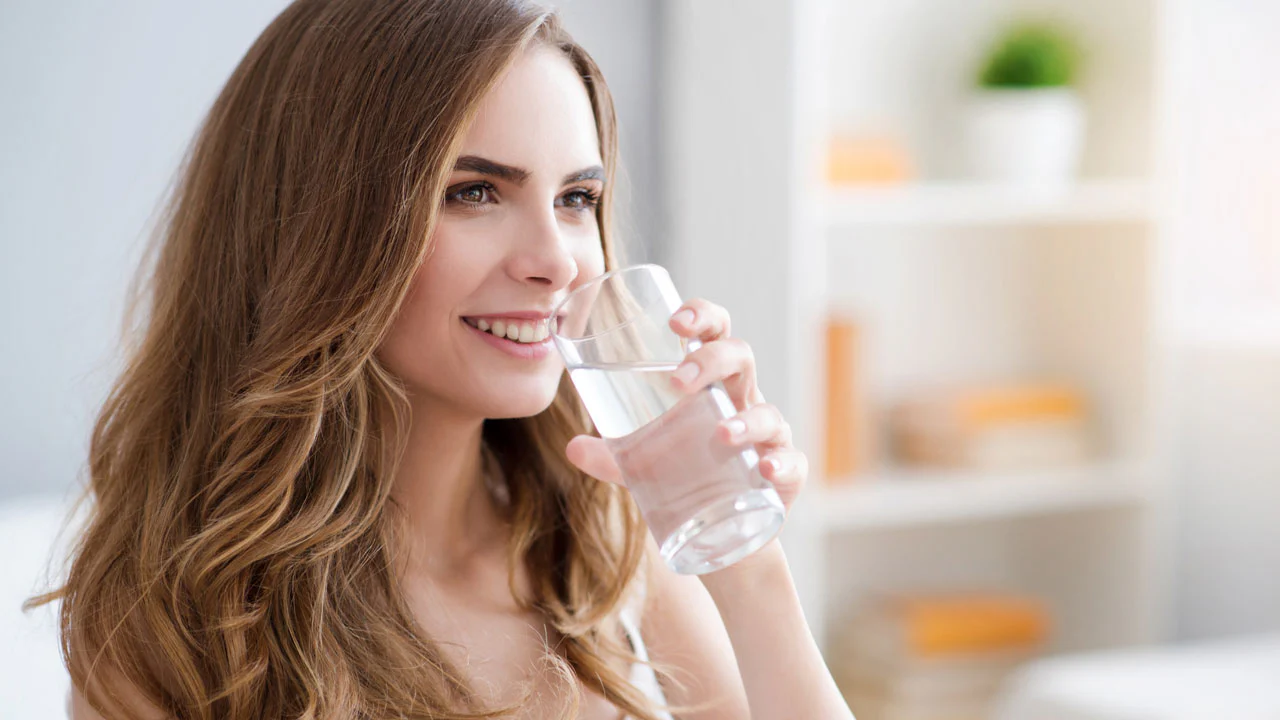
The need to stay hydrated
Every day we naturally lose water from our bodies – through urine (we pee on average 7 – 8 times per day) and sweating. If this liquid is not replaced regularly we could become dehydrated – a condition that can lead to serious health issues like dizziness, confusion, low blood pressure or even unconsciousness.
We can go for days and weeks without food but we need water on a regular basis. In fact people have fasted for sixty days or more subsiding on water alone. To help keep our blood sugar levels normal we need to stay hydrated.
Benefits of drinking water
Water can help you lose weight if you know when to drink it. A recent study which was published in the Obesity Journal, showed the ideal time to have a glass of water for weight loss is drinking it before your meals. It gives your gut a fuller feeling so you tend to eat less.
Try it for yourself – over the next few weeks have a glass of water before your major meals.
If you want clear, healthy looking skin then drink up. Water helps to flush impurities that can cause blotchy, dry or oily skin – out of your system.
The best drink to soften stool and keep your bowels flowing freely everyday is – you guessed it – water.
Your muscles need water to stay energized and work efficiently. So before you hit the gym be sure to pack the water bottle.
How much should you drink?
Many health professionals recommend having at least eight cups of water each day. Some of us need this amount and even more.
If you’re very active during the day and burn a lot of energy like professional athletes, cooks, or construction workers – then your fluid needs will be greater.
Sitting at a desk for hours at a time doesn’t burn up a lot of physical energy therefore the need to hydrate wouldn’t be as great.
In addition to sitting for long hours there is the siren call of the vending machines with a ready supply of sugar filled goodies just tempting you. (The water you get from sodas and other sweetened drinks will only increase your chances of developing pre-diabetes . . . . avoid them at all cost.)
Studies and my personal observations tells me that thirst is the best indicator of how much we should drink. I don’t think that I must guzzle eight or more glasses of water daily because a desk jockey determined that this is the ideal amount.
Another indicator of how much water we need is the color of our urine. The lighter it is the less water you probably need and a darker color means you need to hydrate.
Types of bottled water
Many bottled waters that line the store shelves are owned and distributed by the major bottling companies – Coca Cola, Pepsi Cola and Dr Pepper – and as a consequence get lots of media time. They can make outrageous claims about their products because they are not monitored as closely as the local municipal water companies.
A lot of these products claim to be all natural however if you read the label you will see such things as high fructose corn syrup, arsenic and calcium chloride as ingredient. The last time I checked water was supposed to be a natural product – tasteless, odorless and clear in color.
The next time you visit the local corner store to quench your thirst check out the number of choices you are faced with.
I have found the following types of bottled water lining the coolers in the stores I frequent – distilled water, well water, artesian well water, purified water, spring water, vitamin water, mineral water, sparkling water. The list goes on . . . . Maybe you may have noticed them also.
What is the best type to have?
If you do a consistent exercise program or play sports such as basketball and tennis or in general live an active life-style then it’s important to replace the water lost with the right fluids.
In my opinion natural spring water is the best type to have simply because it’s coming from the earth without any adulteration. It has all the necessary minerals and nutrients we should get from this life-giving liquid. To get this type of water however you will need to find a natural source. And many times this is just not possible.
The next best source is well water which comes from wells dug to tap into a natural water source. If you live outside city limits there is probably a source near you.
Although artesian well water comes from a well, it’s bottled away from the source and . . . . it’s processed and purified. In spite of this I think it is still better than most water found in the local market.
My fourth option for good drinking water is to use a filter at home. There are many types of these on the market – those that are attached to a faucet, specialized water pitcher or even a filter for the water coming into your house.
If you choose to use a water filter at home for purification it should remove the common contaminants found in your area. The most common ones are lead, arsenic, nitrate, and E. coli bacteria. You might need to test the water quality in your area or check with the local municipal water supplier to find out what additives are in your water.
A filter using a solid charcoal filtration process appears to be better at removing most contaminants.
Remember to avoid plastic containers especially those that feel soft and squeezable in your hands. A good investment as part of your healthy life style is a glass bottle that can be cleaned after each use. I use one with a rubber padding so if it falls over it won’t break. Alternatively, a hard plastic bottle can also be used.
Things to avoid when hydrating
If you are drinking fruit juices to quench your thirst then I advise you take a second to read the ingredients label. These types of drinks are loaded with sugars and other additives even though the label says all natural. We must avoid unnecessary sugars at all cost.
Sports drinks such as Powerade, Gatorade and Red bull being advertised is also full of additives that’s not necessary for proper hydration.
Ice tea – whether sweetened or unsweetened – should also be on the list of drinks to avoid as it is a diuretic and cause you to lose an unnatural amount of water.
If you do high intense interval training, like I recommend, then you need to stay hydrated throughout even on your off days. Fill up on the best water for better health and fitness results.
I do drink several cups of water each day but I do so when I am thirsty or when the weather is hot. I am more mindful of the quality of water I put into my body. I get lots of sugars from other sources besides fizzy drinks.
This is another arrow in my quiver . . . . to fight the battle against wacky blood sugar levels.

Pingback: How to prevent pre-diabetes | The right nutrition to prevent pre-diabetes